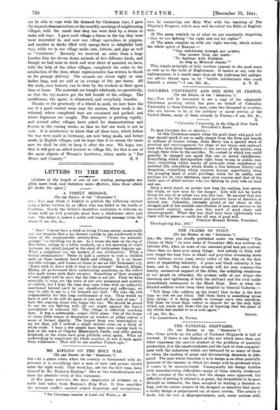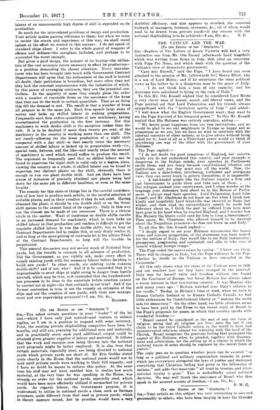THE NATIONAL SHIPYARDS.
[To raz Emma or ran " flescurroa."1
Sm,—Your article on the policy of National Shipyards is full of interest. If there is one feature of the war which more than any other impreseas the careful student of the problem of quantity production, it is the amateurishness and the lack of close acquaint- ance with the industries which are betrayed by so many of those to whom the making of great and far-reaching decision; is dele- gated: The man whose function it is to design Mao often painfully ignorant of the manner in which his design will be produoed when it comes to be manufactured. Consequently his design bristles with manufacturing difficulties—many of them utterly irrelevant to the success of the article; but the design once approved, the difficulty of getting it altered is so great, the formalities to be-gone through so extensive, the time occupied in making a decision so long, and the amour propre Of the designer so sensitive that many a faulty design is perpetuated out of sheer inertia. The article is made, but its cost is disproportionate, and, more serious still.
labour of an unnecessarily high degree of skill is expended on its .production.
So much for the interrelated problems of design and production. Your artiole makes Passing reference to them; but when we come to review the events and experience of this war, we shall stand aghast at the effort we wasted in this manner. I do not speak of standard ships alone. I refer to the whole gamut of weapons of offence and defence--,the aeroplane included, and perhaps to be accounted the worst example.
But given a geed design, the manner of its buying—the utilisa- tion of the vast economic forces necessary to effect its production— to a problem demanding the closest attoetion. Every manufac- turer who has been brought into touch with Government Contract Departments will agree that the enthusiasm of the staff is beyond all .doubt, their patriotism is boundless, but more often than not they lack the remotest acquaintance with the industries of which, by this power of arranging contracts, they are the potential con- trollers. In the majority of races they simply place the order with a number of reputable firms on the assurance of the firma that they can do the work in certain quantities. They go on doing this till the demand is met. The reeult is that a number of firms all prepare to do the .same job. Each firm spends large some of money and locks; up skilled labour in making preparations. Frequently each firm orders quantities of new machinery, having overestimated the production in the first instance. For this machinery to work double shift is the exception rather than the rule. It is to be doubted if more than twenty per cont, of the machinery in the country is working more than one shift. The net result—allowing for the lower production of a night shift compared with a day shift—is that nearly twice the necessary amount of skilled labour is locked up in preparation work—i.e., -special took, fixtures, and the like—and nearly twice the amount of machinery is used which would suffice to produce the result. The argument so frequently wed that no skilled labour can be found to supervise the night shift is valid only to a degree, since, viewing the country as a whole, if skilled labour can be found to supervise two distinct plants on day shift, obviously there is enough to run one plant double shift. And yet there have been scores of instances of precisely identical new plants being laid down for the same job in different localities, or even in the earns The remedy for this state of things lies in the careful comsidera- tion of how best to produce each article, in the careful selection of suitable plants, and in their creation if they do not exist. Raving obtained the plant, it should be run double shift or on the three- shift system to the utmost limit of its capacity. Only in this way can the utmost me be made of our resources. There is a vicious circle in the roatter. Want of insistence on double shifts results in an increased demand for machinery, which in turn locks up skilled labour in that production and renders it difficult to get the requisite skilled labour to run the double shift; but so long as Contract Departments fail to realize this, or only dimly realize it, and so long as the mere getting of contracts let is the ultimo Thule of the Contract Departments, so long will the trouble be perpetuated. • This general discussion may not savour much of National Ship- yard's, but the trouble is common to all schemes of production. Did the Government, an you rightly oak, make every effort to supply existing yards with the nemesary labour beforo deciding to build new yards ? In other words, are existing yards running double shift? and if not, why? And if it be contended that it is impracticable to erect ships at night owing to danger from hostile aircraft, which may be true, is it contended that the hundred-and- one processes to be done to the materials before erection cannot be carried out at night—for that certainly is not true? And if the former contention is true, is not the remedy an extension of the slips and not the creation of new yards, with their new manage- ment and new supervising personnel t—I am, Sir, fie., Remount.



































 Previous page
Previous page